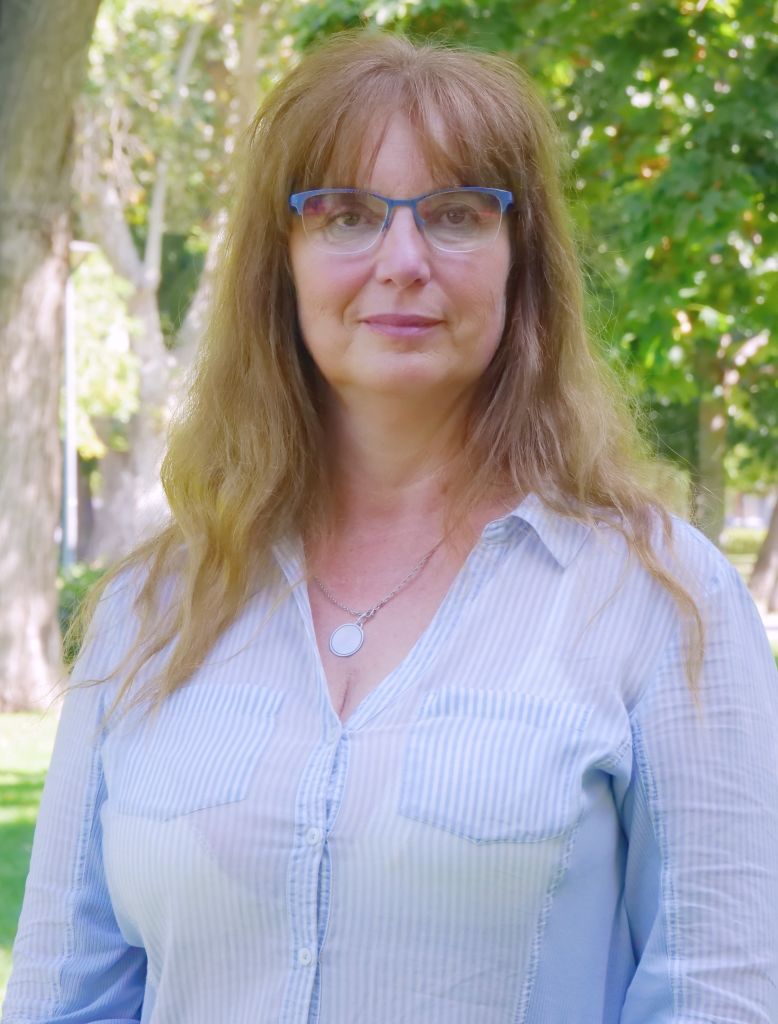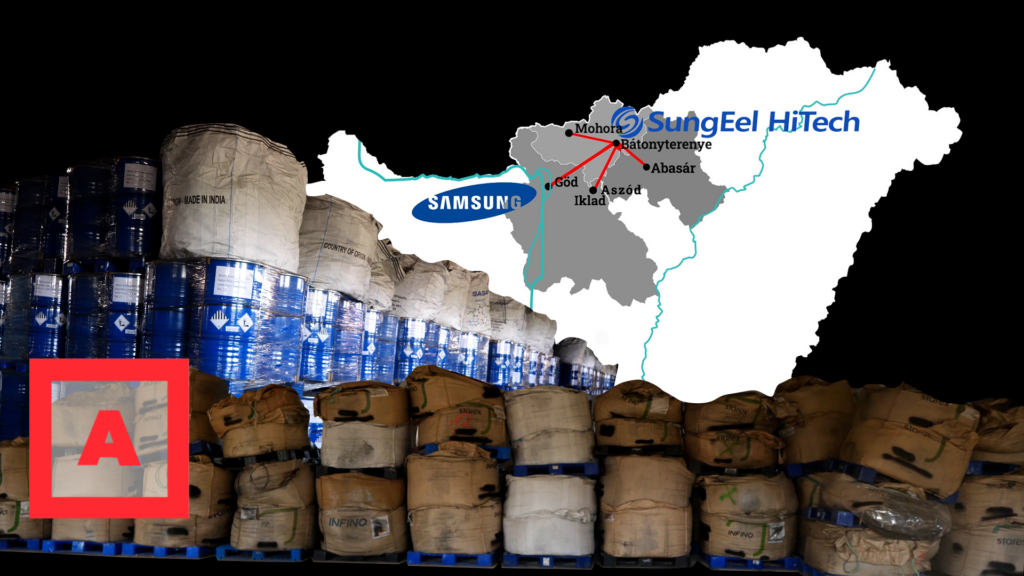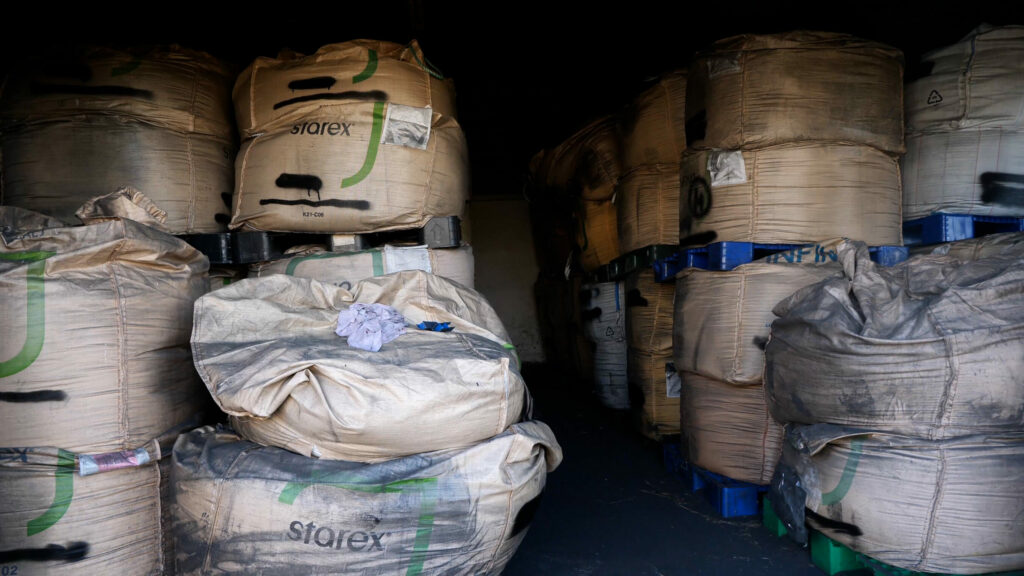The https://english.atlatszo.hu use cookies to track and profile customers such as action tags and pixel tracking on our website to assist our marketing. On our website we use technical, analytical, marketing and preference cookies. These are necessary for our site to work properly and to give us inforamation about how our site is used. See Cookies Policy
SungEel’s hazardous battery waste has been stored in hidden, illegal warehouses for a year now
We have found more barrels full of waste and bags of black powder from battery factories and the battery processing plant in Bátonyterenye in rural areas where illegal storage has been going on for a year. Much of the hazardous materials are stored in open warehouses without fire protection or under the open sky. According to the authorities, several measures are “underway”, but so far no significant cleanup happened.
Last summer, Átlátszó was the first to report that waste from battery production was being stored without authorization at several sites in Hungary. The hazardous substances, which smell of caustic chemicals, were put into tomato barrels and hidden in abandoned industrial sites or warehouses in rural areas.

One such site is Abasar, at the foot of the Mátra Mountains, where 11,000 barrels totaling 1,700 tonnes of hazardous waste were dumped in the buildings of a former military barracks.
However, the illegal storage in Abasar and the environmental risk identified by the authorities have not been eliminated in the past year, and new chemical-smelling barrels have been found on the site.
As a result of our previous stories, the Heves County Government Office fined László Tibor Karácsony, a private entrepreneur who carried out illegal warehousing, a hundred million forints.
With such a large fine, we had every reason to hope that the illegal waste would disappear from the settlement, but we were wrong.
The Government Office has called on László Tibor Karácsony to remove the waste 50 times, without result. Even though each of the notices has been accompanied by an enforcement fine of half a million forints.
More barrels filled with discarded batteries
In August, when we visited the Abasar site, we were shocked to find that the number of barrels full of waste had not decreased, but had increased. Not only are two warehouses full to the brim with them but they are now being dumped outside too.
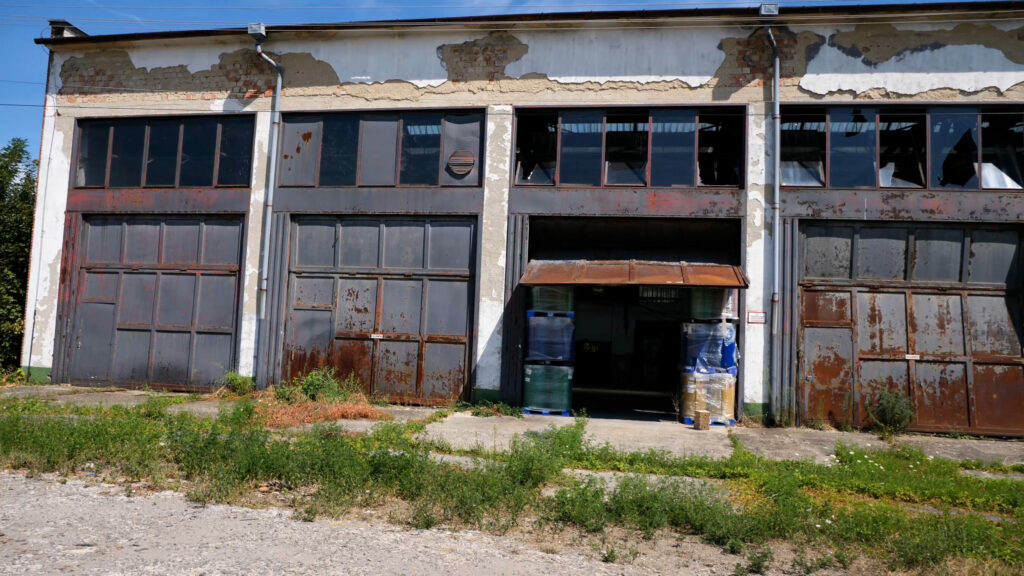
Barrels full of hazardous materials at the door of a warehouse in Abasar (Photo: Dénes Balogh/Átlátszó)
The former military barracks, where the illegal storage is taking place, is closed only from the main road up from Abasar. From the side, the gate is open, anyone can enter. The football pitch and go-kart track also seem to be under use, although it is not known with what regularity.
Flammable and toxic substances are only 100-200 meters away.
Last year, the barrels still bore a false code indicating non-hazardous waste. However, after our stories were published, the authorities reclassified the material and required code 19 12 11 to indicate that the waste was hazardous. The barrels were also marked with pictograms indicating the hazardous nature of the waste, and the pallets were marked with Samsung SDI in several places.
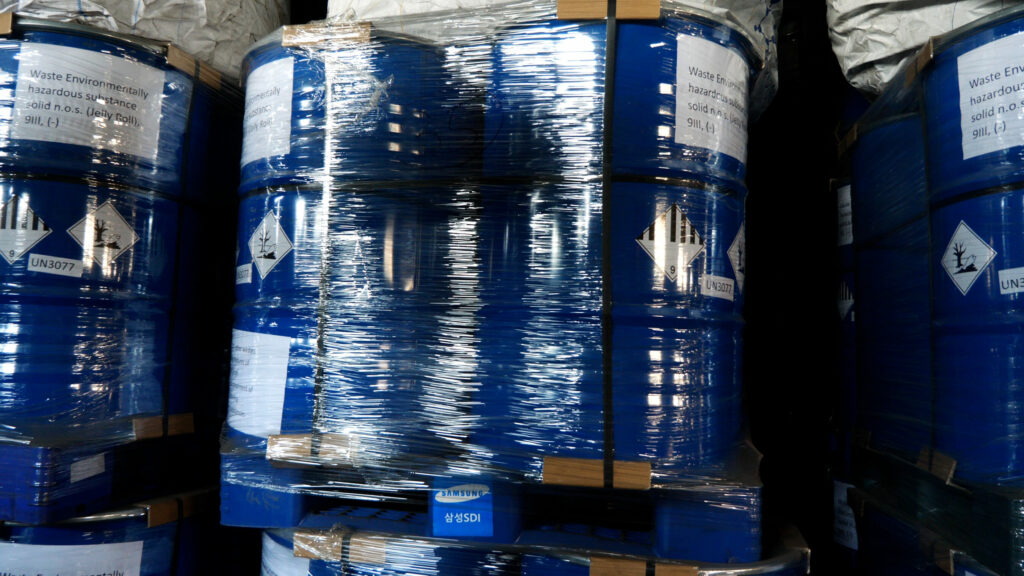
Barrels with hazardous waste codes and stickers in Abasar, with the Samsung SDI sign on the pallet (Photo: Átlátszó/Balogh Dénes)
It appears that in Abasar, not only are the original drums being relabelled and foiled, but more are being filled – although it is also possible that the old drums are being repacked into new ones. However, it is not known who is doing this, under what kind of official control, and whether the toxic substance is escaping into the environment in the process.
In any case, despite the filming, the huge amounts of waste give off a very strong, pungent chemical smell, even around buildings. In addition, large bags of packaging waste containing hazardous substances, marked with the code 15 01 10, have been piled up next to and on top of the barrels – and the bags, unlike the barrels, are unsealed.
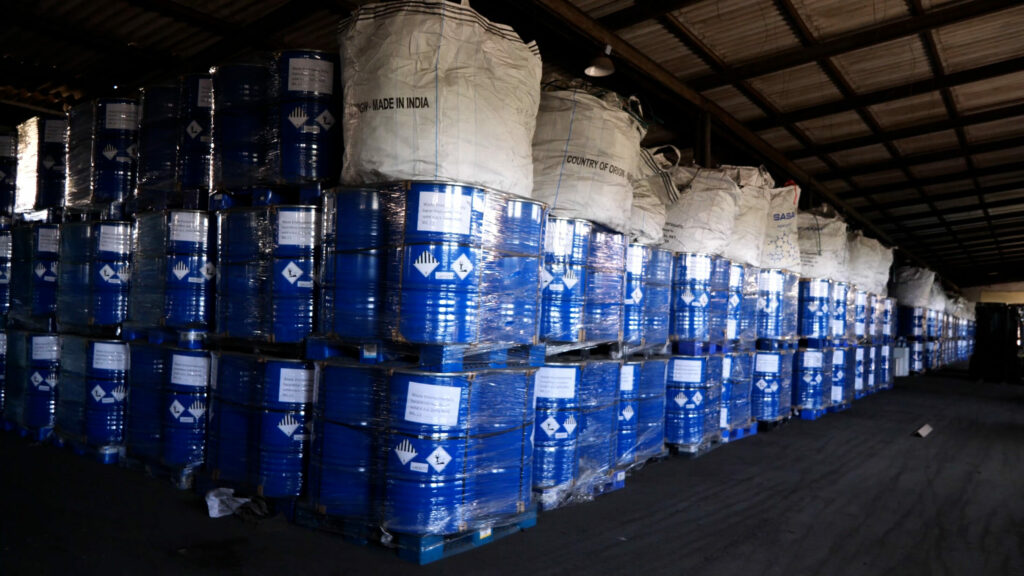
The bags on top of the new drums contain packaging waste containing hazardous materials (photo: Átlátszó/Balogh Dénes)
In June, the mayor of Abasar, Attila Kazsu, gave residents the false hope that the municipality would finally get rid of hazardous materials. As previously reported, the mayor posted on his Facebook page that the removal of the waste had begun. The photos he included showed the barrels loaded onto the trucks.
Now we tried to find out from Attila Kazsu where he got the photos and what he knows about the transport process. But Mr Kazsu evaded the question, saying that the site was on private property and that the Abasar municipality had “no involvement” in the matter. The mayor named the environmental authority as the competent authority.
The Heves County Government Office’s website, however, only published new notices during the summer stating that Abasar “continues to have large quantities of waste with the identification code 19 12 11 HAK.”
As the government office did not respond to our request, we sent them our questions in a public data request. We wanted to know when the removal of the waste would be completed, if indeed it had started, and for how long the situation they described as dangerous to the environment would persist.
However, after 30 days, the Government Office replied only that “the removal of the waste is underway” and that the environmental risk was “steadily decreasing”. This was not the case we experienced on the ground. We also did not get an answer as to whether the warehouses where flammable materials are stored have fire protection.
SungEel Ltd. also responsible for illegal waste dumping
However, it is not only the fined László Tibor Karácsony who is responsible for the unauthorized storage. The private entrepreneur brought the drums from the battery processing plant of SungEel Kft. in Bátonyterenye. This is the plant whose operation was suspended by the Nógrád County Government Office in August last year for waste management offenses and then re-licensed in July this year.
The suspension decision ruled that both SungEel Ltd. and the fined contractor were responsible for the unauthorized storage of the battery waste and that the South Korean company remained the owner of the waste.
The decision to allow SungEel’s plant in Bátonyterenye to resume operations means that the company has now complied with all the requirements of the authorities.
The authority has also banned the transport of hazardous waste classified under code 19 12 11, currently stored in Abasar,
to Bátonyterenye, and the company has undertaken not to treat or receive any material generating this type of waste in the future.
However, on 23 July, SungEel’s site in Szigetszentmiklós received a new, amended waste management permit from the Pest County Government Office. The scope of the materials that can be collected has been extended, and the collection, pre-treatment, and recovery of hazardous waste, coded 19 12 11, has been authorized.
In other words, while one county authority prohibited the transport of waste in drums to Bátonyterenye, another authority authorized the company to treat this type of waste in Szigetszentmiklós.
As we have previously reported, the waste processing plant in Szigetszentmiklós does not have an environmental or industrial safety permit, as the authorities say that the plant, which processes more than 7,000 tonnes of waste a year, “has no significant environmental impact”.
We have sent our questions on the matter to SungEel Ltd, but the company has not responded to our inquiries.
Hiding hazardous substances for a year in Iklad and Mohora
SungEel has not only scattered its rubbish in Abasar but also in Iklad in Pest County and other locations. The abandoned industrial site in Iklad, like the one in Abasar, is not properly fenced off and virtually anyone can go in there, as we did.
In the halls of the plant, with the knowledge of the disaster management authority, László Tibor Karácsony had been storing barrels full of discarded battery cells from the SungEel plant for a long time without permission. These were removed rather quickly after our story was published last year, as it later turned out, to Bátonyterenye.
However, there were still large quantities of bags and boxes of black powder with Korean writing on them, which have not been removed or inspected since.
Black powder (the “black mass”) is an intermediate product of battery processing, from which valuable materials (lithium, nickel, cobalt, copper, and graphite) can be extracted by a special process. The bags and boxes are labeled “Made in Korea”, “SDI Hungary” and “Mitsubishi Chemical Corporation” on the side, and one bag has been labeled “Black powder”.
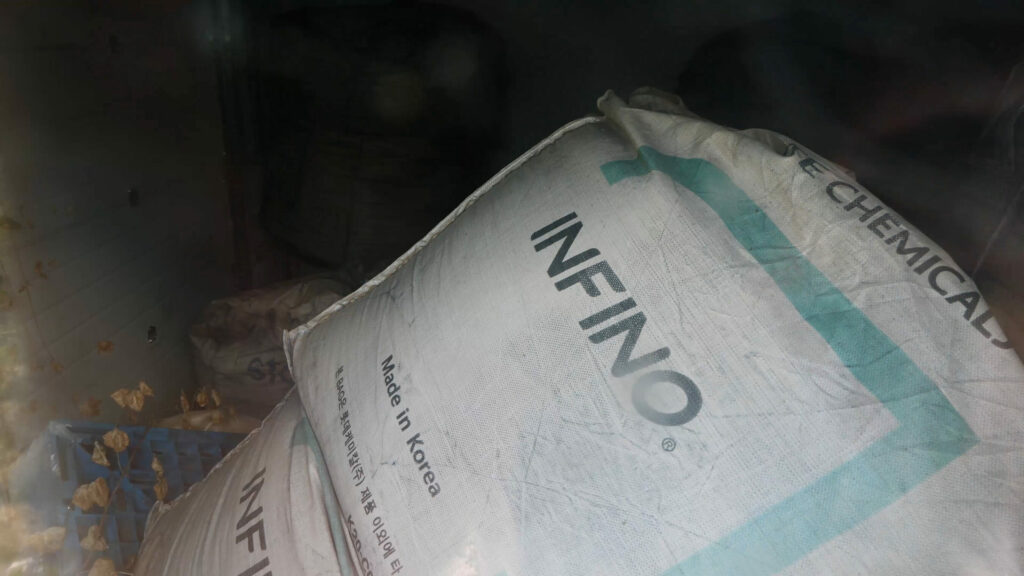
Bags of black powder marked “Made in Korea” in a warehouse of the Iklad industrial plant (Photo: Átlátszó/Balogh Dénes)
One of the boxes was also found to have been previously left with a packet of documents. It is a certificate of analysis containing laboratory test data for a cargo weighing 14.5 tonnes, and it also contains the name of Samsung SDI Ltd. The document also includes the name of Qingdao Lingda Kasei Co Ltd, a company that manufactures and sells anode material for lithium-ion batteries and is a subsidiary of Mitsubishi Chemical Corporation.
But bags full of black powder were also found in Aszód and in the village of Mohora in Nógrád county, where the fined Hungarian enterpreneur also had premises. The authority was well aware of these sites and the unauthorized waste storage, as it was described in the August 2023 decision suspending the operation of SungEel Ltd:
“On 18 July 2023, the Government Office carried out an official inspection at the properties at parcel 05/21 Mohora, during which it found a large quantity of unmarked carbon dust at the Mohora property.”
The “carbon dust” found at Mohora has not been removed since last summer.
Here, large bags of batteries are stored in a semi-ruined agricultural warehouse next to a cornfield in the village’s former goose farm.
The Korean inscriptions on these have been partially crossed out, and the contents are not indicated, but one pallet reads Anode Active Materia and another Cathode Active Materia. Over a thousand metal drums were also stockpiled on site, but these are now empty. However, the amount of black powder in the bags could be several thousand kilograms.
The illegal storage in Mohora was revealed by LMP politician Antal Csárdi, who had the samples from the bags tested in an accredited laboratory. According to the test reports, one of the samples contained lithium, cobalt, nickel, and the fetal toxicant NMP. Antal Csárdi told Átlátszó that according to the disaster management authority, the mixture of substances in the bags is not on the list of hazardous substances under the legislation.
A public forum was also held in Mohora, where outraged residents said that immediate action was needed. However, Antal Csárdi has managed to get the disaster management authority to start a new official procedure, which is expected to be completed by September.
In conclusion, the illegal storage of SungEel’s battery waste has not only gone unchecked by the authorities but has also assisted in the storage of toxic and flammable materials in warehouses without fire protection. It is difficult to explain why the waste was removed from Aszód and not from the other sites. It seems that the only aim was to remove the accumulated waste from the sites in Bátonyterenye and Szigetszentmiklós so that the battery processing plants could restart their operations.
MOL to get into the battery waste business
But there is also no answer as to how Samsung SDI, alongside SungEel Ltd, is responsible for the disposal of hazardous waste at various sites in Hungary. The South Korean press seems to be better informed on the matter. In a video on the news portal The Elec, an expert analyzing the situation of South Korean companies in Hungary talks about how an employee of Samsung’s Göd factory was sentenced to two years in prison for waste management offenses. However, no news of this has been made public by the Hungarian authorities.
The government has further plans to expand battery processing in Hungary. This is indicated by the fact that Minister of Economic Development Márton Nagy held talks in South Korea with the heads of several battery companies and received representatives of SungEel Hitech in in June. A statement by the Ministry of National Economy on 21 August confirms SungEel’s expansion plans in Hungary.
In addition, the Ministry’s press release states that “the MOL Group is also actively interested in business opportunities in battery recycling”. According to the release, “Economic cooperation between the MOL Group and a globally significant battery processing and recycling company could be mutually beneficial for the Hungarian economy.”
Written and translated by Zsuzsanna Bodnár, the Hungarian version of this story is here.
Share:
Your support matters. Your donation helps us to uncover the truth.
- PayPal
- Bank transfer
- Patreon
- Benevity
Support our work with a PayPal donation to the Átlátszónet Foundation! Thank you.
Support our work by bank transfer to the account of the Átlátszónet Foundation. Please add in the comments: “Donation”
Beneficiary: Átlátszónet Alapítvány, bank name and address: Raiffeisen Bank, H-1054 Budapest, Akadémia utca 6.
EUR: IBAN HU36 1201 1265 0142 5189 0040 0002
USD: IBAN HU36 1201 1265 0142 5189 0050 0009
HUF: IBAN HU78 1201 1265 0142 5189 0030 0005
SWIFT: UBRTHUHB
Be a follower on Patreon
Support us on Benevity!
